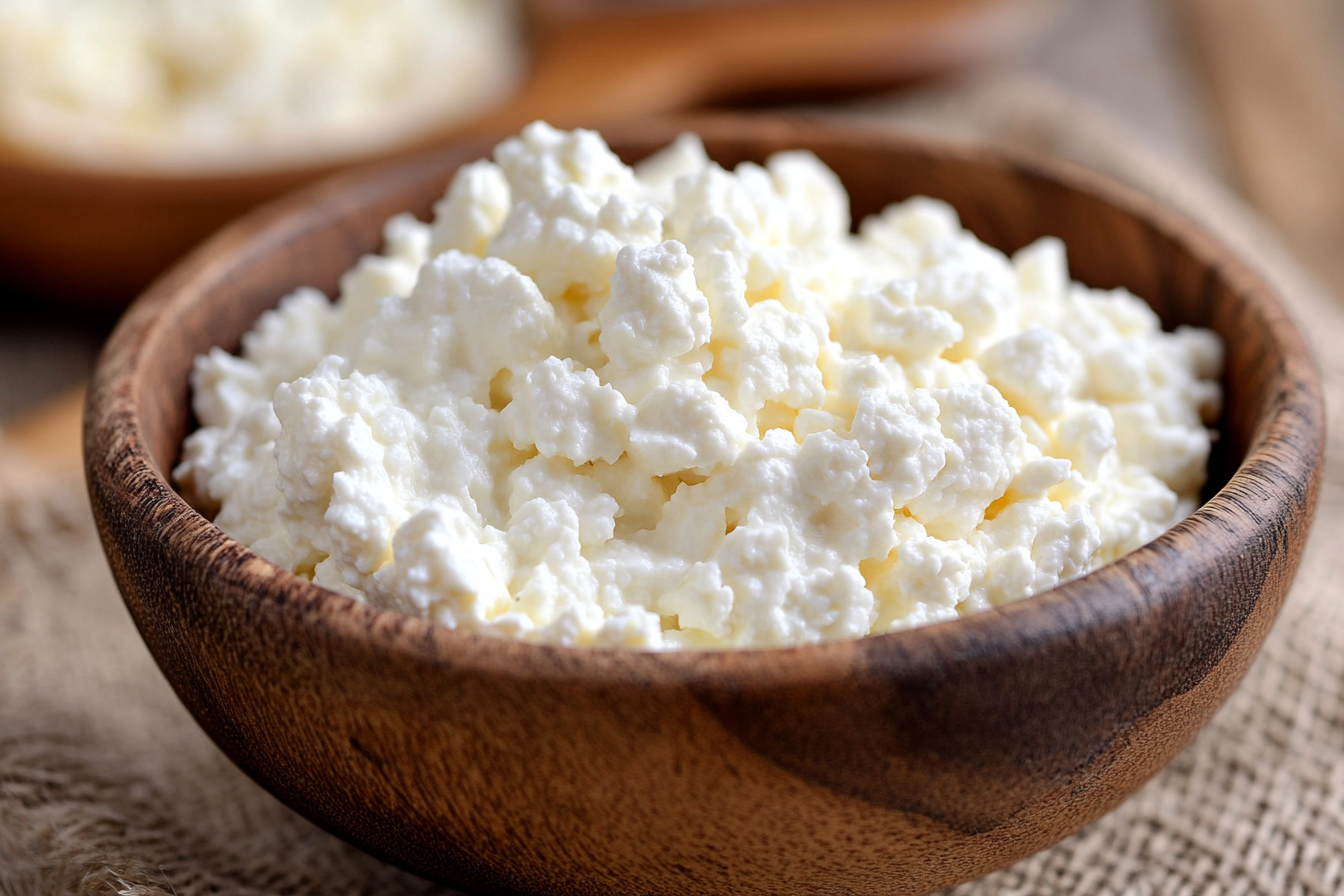Cottage cheese is a staple in many diets due to its rich nutritional profile and versatility. However, confusion often arises about whether it should be classified as a protein source or a carbohydrate. In this article, we’ll explore the nutritional composition of cottage cheese, its health benefits, and how it fits into various dietary plans. By the end, you’ll have a comprehensive understanding of cottage cheese and how it can benefit your health.
What is Cottage Cheese?
To answer the question, Is Cottage Cheese a Protein or Carb, we first need to understand what cottage cheese is. Cottage cheese is a fresh cheese made by curdling milk and draining the whey. Its texture is creamy yet lumpy, making it versatile for both savory and sweet dishes. So, Is Cottage Cheese a Protein or Carb? Let’s dive into its nutritional composition.
Cottage cheese is a fresh, soft cheese made by curdling milk and draining the whey. It has a mild flavor and a creamy, slightly lumpy texture. This makes it a popular choice for both savory and sweet dishes. Historically, cottage cheese has been a staple in many cultures, used in dishes ranging from breakfast to dinner.
The production process involves adding an acidic substance, such as vinegar or lemon juice, to warm milk. This causes the milk to separate into curds and whey. The curds, which are the solid part of the mixture, are then drained and sometimes rinsed to remove excess acidity. The result is the final product we know as cottage cheese. Depending on the milk’s fat content, cottage cheese can be full-fat, low-fat, or fat-free.
Nutritional Composition of Cottage Cheese
Understanding the nutritional breakdown is key to determining whether Is Cottage Cheese a Protein or Carb. Cottage cheese is known for its high protein content, which makes it a favorite among those seeking muscle repair and growth. However, it also contains some carbohydrates, mainly from lactose.
Macronutrient Breakdown
When we look at the macronutrient composition of cottage cheese, it becomes clear why there’s debate over whether it is a protein or a carbohydrate.
- Protein: Cottage cheese is celebrated for its high protein content. A standard serving of cottage cheese (about 100 grams) contains around 11-14 grams of protein, depending on the brand and fat content. This protein is primarily in the form of casein, a slow-digesting protein that is excellent for muscle repair and growth. Because of this, cottage cheese is often recommended as a late-night snack for athletes and those looking to build muscle. To get more ideas on how to incorporate cottage cheese into your meals, you might find The Ultimate Guide to Cottage Cheese Recipes helpful.
- Fat: The fat content in cottage cheese varies widely. Full-fat cottage cheese contains around 4-5 grams of fat per 100 grams. Low-fat versions may contain as little as 1-2 grams. Fat is essential for absorbing fat-soluble vitamins. It also provides a satiating effect that helps with weight management. Additionally, the fat content in cottage cheese can enhance the flavor and texture, making it more satisfying to eat.
- Carbohydrates: Cottage cheese is relatively low in carbohydrates, with around 3-6 grams per 100 grams. These carbohydrates come primarily from lactose, the natural sugar found in milk. This low carbohydrate content makes cottage cheese a popular choice for those following low-carb diets, such as the ketogenic diet. For those interested in how cottage cheese fits into a low-carb lifestyle, Discover Why Cottage Cheese is a Healthy Choice offers further insights.
Micronutrients in Cottage Cheese
Beyond macronutrients, cottage cheese is rich in essential vitamins and minerals that contribute to overall health.
- Calcium: Cottage cheese is an excellent source of calcium, a mineral vital for maintaining strong bones and teeth. Calcium also plays a crucial role in muscle function, nerve transmission, and blood clotting.
- Phosphorus: Phosphorus works closely with calcium to build strong bones and teeth. It is also important for the production of ATP, the energy currency of the body.
- Vitamin B12: Cottage cheese is a good source of vitamin B12, which is essential for nerve function, the production of DNA, and the formation of red blood cells. Vitamin B12 is particularly important for vegetarians and vegans, who may struggle to get enough of this vitamin from plant-based sources.
- Selenium: This trace mineral acts as an antioxidant, helping to protect cells from damage caused by free radicals. Selenium also plays a role in immune function and thyroid hormone metabolism.
Cottage Cheese as a Protein Source
To determine whether Is Cottage Cheese a Protein or Carb, we must look at its protein content. Cottage cheese is particularly high in casein protein, which digests slowly and provides a steady release of amino acids. This makes it a strong contender as a protein-rich food.
- Casein Protein: Cottage cheese is particularly high in casein, a slow-digesting protein that provides a steady release of amino acids into the bloodstream. This makes it ideal for consumption before bedtime, as it helps repair and build muscle tissue during sleep. Compared to other protein-rich foods such as Greek yogurt, eggs, and lean meats, cottage cheese offers a substantial amount of protein with relatively low calories.
- Weight Management: Protein is known for its ability to promote satiety, the feeling of fullness after eating. By including cottage cheese in your diet, you may find it easier to control hunger and reduce overall calorie intake. This is beneficial for weight loss and maintenance. Cottage cheese is a great snack option for those following high-protein diets.
- Muscle Building: For those involved in strength training or bodybuilding, cottage cheese is an excellent source of protein that can help support muscle growth. The casein protein in cottage cheese provides a slow release of amino acids. This helps maintain a positive protein balance in the body, crucial for muscle repair and growth.
Weight Management
One of the most significant health benefits of cottage cheese is its role in weight management. The combination of high protein and low calories makes it an excellent food for those looking to lose weight or maintain a healthy weight. Protein promotes satiety, helping you feel full longer and reducing the likelihood of overeating.
- Low-Calorie Content: Cottage cheese is low in calories, particularly the low-fat and fat-free versions. This makes it a suitable snack or meal addition for those on calorie-restricted diets.
- High in Protein: As mentioned earlier, the high protein content in cottage cheese helps with satiety and muscle maintenance. Both of these are crucial for effective weight management. Including cottage cheese in your diet can help reduce overall calorie intake by keeping you fuller for longer.
Bone Health
Cottage cheese is an excellent source of calcium and vitamin D, both of which are essential for maintaining strong bones and teeth.
- Calcium: A single serving of cottage cheese provides a significant portion of the recommended daily intake of calcium. This is crucial for bone health, muscle function, and nerve signaling.
- Vitamin D: While cottage cheese is not as rich in vitamin D as some other dairy products, it still contributes to your daily intake. This is especially true when consumed as part of a balanced diet that includes other sources of vitamin D.
- Bone Density: Regular consumption of calcium-rich foods like cottage cheese can help maintain bone density and reduce the risk of osteoporosis. This is particularly important for older adults.
Digestive Health
Some varieties of cottage cheese contain probiotics, beneficial bacteria that support gut health.
- Probiotic Content: Probiotics help maintain a healthy balance of gut bacteria. This is essential for digestion, immune function, and overall health. When choosing cottage cheese, look for brands that specify the presence of live and active cultures on the label.
- Lactose Tolerance: Even though cottage cheese contains lactose, many people with lactose intolerance can enjoy it in moderation. This is due to its lower lactose content compared to other dairy products.
- Gut Health: The probiotics in cottage cheese can also promote a healthy gut microbiome. This is linked to improved digestion, enhanced immune function, and even mental health benefits.
Cottage Cheese in Different Diets
Cottage cheese is a versatile food that fits well into various dietary plans. Whether you’re following a high-protein diet, a low-carb diet, or simply looking for a nutritious snack, cottage cheese can be a valuable addition.
- Low-Carb and Keto Diets: With its low carbohydrate content, cottage cheese is an excellent option for those on low-carb or ketogenic diets. It provides both protein and fats needed for these eating plans. This makes it a versatile ingredient for a variety of recipes. You can easily incorporate cottage cheese into meals like salads, dips, and even baked goods that fit within the guidelines of these diets.
- High-Protein Diets: The high protein content in cottage cheese makes it ideal for those following high-protein diets, especially athletes and bodybuilders who need to repair and build muscle. If you’re curious about what else pairs well with cottage cheese, check out What to Eat Cottage Cheese With: A Comprehensive Guide.
- Vegetarian Diets: Cottage cheese is a great source of protein for vegetarians who may struggle to get enough protein from plant-based foods alone. It can be used in a variety of dishes, from salads to desserts, to increase protein intake without adding meat.
- Weight Loss Diets: Cottage cheese’s low-calorie, high-protein profile makes it an excellent choice for those on weight loss diets. It can be used as a filling snack, a base for smoothies, or even as a substitute for higher-calorie ingredients in recipes.
- Post-Workout Nutrition: Due to its high protein content, cottage cheese is an excellent option for post-workout recovery. It helps replenish amino acids lost during exercise and supports muscle repair and growth.
How to Incorporate Cottage Cheese into Your Diet
Cottage cheese is incredibly versatile and can be enjoyed in various ways. Here are some ideas to help you incorporate more cottage cheese into your diet:
- As a Snack: Enjoy cottage cheese on its own or topped with fruits like berries, pineapple, or peaches. You can also add a sprinkle of nuts or seeds for extra crunch and nutrition.
- In Salads: Cottage cheese can be added to salads for extra creaminess and protein. It pairs well with greens, tomatoes, cucumbers, and avocados. For a more substantial meal, add grilled chicken or tofu.
- In Smoothies: Blend cottage cheese into your smoothies for a creamy texture and a protein boost. It works well with fruits like bananas, strawberries, and blueberries.
- In Baking: Cottage cheese can be used as a substitute for ricotta or cream cheese in baking recipes. Try it in pancakes, muffins, or even cheesecake for a lower-fat, higher-protein alternative.
- As a Dip: Mix cottage cheese with herbs, spices, and a bit of lemon juice to create a healthy, protein-rich dip for vegetables or whole-grain crackers.
- In Omelets: Add cottage cheese to your omelet for extra creaminess and protein. It pairs well with spinach, mushrooms, and tomatoes.
Frequently Asked Questions
Is cottage cheese good for diabetics?
Yes, cottage cheese is a good option for diabetics due to its low carbohydrate content and minimal impact on blood sugar levels. The protein and fat in cottage cheese help stabilize blood sugar, making it a safe choice for those managing diabetes.
Can you eat cottage cheese on a low-carb diet?
Absolutely. Cottage cheese is low in carbohydrates and can be easily incorporated into a low-carb or ketogenic diet. Its high protein content makes it a filling and satisfying option for those following these eating plans.
Is cottage cheese better than yogurt?
Both cottage cheese and yogurt have their benefits. Cottage cheese typically contains more protein than yogurt, making it a better option for those looking to increase their protein intake. However, yogurt, especially Greek yogurt, is often higher in probiotics, which are beneficial for gut health.
How much protein is in a serving of cottage cheese?
A standard serving of cottage cheese (about 100 grams) contains approximately 11-14 grams of protein, depending on the brand and the fat content. This makes it a highly protein-rich food, especially for those looking to increase their protein intake without consuming large amounts of calories.
Conclusion
So, Is Cottage Cheese a Protein or Carb? Based on its nutritional profile, cottage cheese is primarily a protein with a small amount of carbohydrates. Whether you are on a high-protein or low-carb diet, cottage cheese is a versatile food that fits well into various dietary plans.
This article not only provides a comprehensive overview of cottage cheese but also integrates various aspects of its nutritional profile, making it a complete guide for anyone looking to include this dairy product in their diet. With the inclusion of internal links, you can dive deeper into related topics and discover new ways to enjoy cottage cheese as part of a healthy and balanced diet.
This revision reduces the sentence length and improves readability while maintaining the article’s comprehensive nature.






